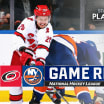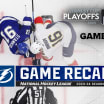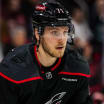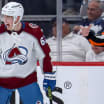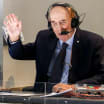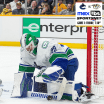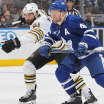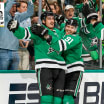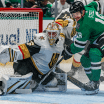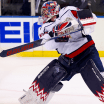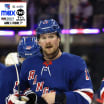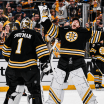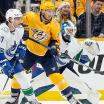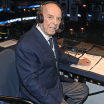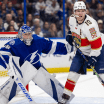The Washington Capitals and Pittsburgh Penguins aren't interested in their regular-season history or the recent past as they prepare to meet in the Eastern Conference Second Round.
The captain of each team, Sidney Crosby for the Penguins and Alex Ovechkin for the Capitals, spent the hours after the matchup was determined with Washington's Game 6 victory against the Philadelphia Flyers on Sunday shooting down the importance of two of the game's biggest stars and two of the East's marquee teams going head-to-head.
Capitals vs. Penguins Second Round preview
Crosby, Ovechkin meet in playoffs for first time since 2009
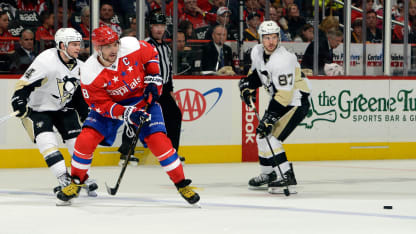
© Greg Fiume/Getty Images
By
Katie Brown and Dan Rosen / NHL.com
"It's going to be an interesting series," Ovechkin said. "It's going to be a hard series. Two good teams play against each other, and we'll see what's going to happen."
Crosby said: "I think, as a player, I'm worried about making sure that you play your best and we do everything we can to move on. I think the other stuff and the storylines is up to everyone else to kind of do that. But as a player, you just focus on trying to win."
The rest of the hockey world is far more excited, remembering the epic seven-game series the only other time Crosby and Ovechkin faced off in the Stanley Cup Playoffs, in the second round in 2009.
The Penguins won the series in seven games. Crosby and Ovechkin each had a hat trick in Game 2. Ovechkin had eight goals and 14 points in the series; Crosby had eight and 13.
Pittsburgh advanced and eventually won the Stanley Cup, defeating the Detroit Red Wings in seven games.
The Penguins, who advanced to the second round after defeating the New York Rangers in five games, won three of five games against the Capitals during the regular season. Ovechkin had no points; Crosby had a goal and three assists.
FORWARDS
Capitals: Washington's best players performed like its best players against Philadelphia. Ovechkin scored two power-play goals and physically dominated whenever he was on the ice, usually against the Flyers' top line. In Game 5, Ovechkin had eight shots on goal and eight hits.
Backstrom, who spent much of the series facing the Flyers' top players, had seven points (two goals, five assists) to lead the Capitals in the first round. Coach Barry Trotz said after Game 6 that Backstrom "imposed his will" against Claude Giroux and Philadelphia's top line; Giroux and the rest of the Flyers' top six combined for four points in the series.
Washington's top six stayed the same with the exception of Game 6, when Marcus Johansson was moved up to second-line left wing and Andre Burakovsky was bumped down to third-line right wing. The move sought to jump-start the second line, which combined for three points in the first round.
Trotz could opt to keep Johansson on the second line, or he might move Justin Williams up to the top line in T.J. Oshie's spot for the second round to help Williams find a spark. Williams had two assists but did not score against the Flyers.
The bottom-six forwards, didn't contribute as much on the scoreboard but were effective as the physical shut-down lines that wore down the Flyers with sustained pressure in the offensive zone. As the third-line center, Mike Richards didn't have a point in the series but elevated his physical play in both zones.
Penguins:Pittsburgh had five forwards average at least one point per game in its five-game first-round series.
Crosby led Pittsburgh with eight points (three goals, five assists) to continue his torrid play. He came into the playoffs with 66 points in 54 games after the Penguins made the coaching change from Mike Johnston to Mike Sullivan on Dec. 13.
Crosby's linemates, Patric Hornqvist and Conor Sheary, combined for five goals and eight points. Sheary joined the line at the end of Game 3. Hornqvist had five points, including a hat trick in Game 1.
Evgeni Malkin had seven points, including two goals and two assists in Game 4 at Madison Square Garden. He missed the first game of the series, still recovering from an upper-body injury. He had a slow start but was excellent in the final two games.
Malkin likely will start the series with Chris Kunitz and Eric Fehr as his linemates. Fehr scored the Penguins' first goal in Game 4, 69 seconds into the game. Kunitz was held without a point against the Rangers.
The Penguins' third line of Nick Bonino, Phil Kessel and Carl Hagelin combined for 12 points (four goals, eight assists). Kessel had half of the points, including three of the goals.
Not to be outdone, the Penguins' fourth line of Matt Cullen, Tom Kuhnhackl and Bryan Rust contributed nine points, with each having three points. Cullen and Rust each had two goals. Kuhnhackl's shorthanded goal in Game 1 was the game-winner.
DEFENSEMEN
Capitals:John Carlson took some of the heat off Ovechkin and scored three power-play goals in the first round. He led Washington defensemen with six points (five on the power play) and averaged 24:58 of ice time, second on the Capitals to Matt Niskanen's 25:32.
Niskanen was easily Washington's best defensive player during the first round, and Karl Alzner was third in average ice time (22:43).
Brooks Orpik was injured by a hit from Ryan White in Game 3 and missed the rest of the first round. His status is unclear for the second round. Orpik was a top penalty-killer and played significant minutes, but his loss wasn't too deeply felt since the Capitals had to play without him for 41 games during the regular season.
Nate Schmidt moved back into the top four, paired with Carlson, and played on the penalty kill. Taylor Chorney made his NHL playoff debut as the sixth defenseman in Game 4. Mike Weber debuted in Game 6.
Penguins: Pittsburgh has a healthy, deep and fast defense this season after having a banged-up, thin and slow defense last season. The Penguins go eight-deep on the blue line, led by the top pair of Kris Letang and Olli Maatta.
Letang's five points led Pittsburgh's defensemen against the Rangers, and his 51.87 shot attempts percentage (SAT%) and average of 27:17 of ice time were the highest on the Penguins. Maatta struggled early in the series but played better late and averaged 18:27 of ice time, which was third among Pittsburgh's defensemen behind Letang and Trevor Daley.
Daley, who averaged 22:41 of ice time, had three assists in the first round. He was particularly strong in Game 5, when he had an assist, four shots on goal and a plus-2 rating in 23:04. His partner, Brian Dumoulin, is one of the Penguins' top skaters.
The third pair of Ben Lovejoy and Ian Cole is more of a shut-down pair. They lead Penguins defensemen in shorthanded time on ice.
GOALTENDERS
Capitals: The Flyers scored six goals in the first round. Five were against Braden Holtby and one was into an empty net. Holtby had two shutouts, 2-0 in Game 1 and 1-0 in Game 6, but he wasn't tested much, especially in Game 5, which Philadelphia won 2-0 despite having 11 shots on goal.
Holtby leads NHL goaltenders remaining in the playoffs with a 0.84 goals-against average and .968 save percentage. His .940 career save percentage in the postseason is first in NHL history among goalies with at least 25 games played.
Penguins: This is where things get very interesting for Pittsburgh, because its No. 1 goalie, Marc-Andre Fleury, may not be its No. 1 goalie anymore even if he is healthy enough to return to the lineup.
Fleury missed the first-round series because of a concussion, which has sidelined him since March 31. Fleury said Monday that he still is experiencing symptoms. Sullivan said he still is considered day-to-day.
Rookie goalie Matt Murray started the final three games against the Rangers after missing the first two with an upper-body injury. He allowed four goals on 89 shots for a 1.33 GAA and .955 save percentage. He had a 31-save shutout in Game 4 at Madison Square Garden and made 38 saves in a series-clinching 6-3 win in Game 5 at Consol Energy Center. It appears Murray will be the Game 1 starter.
Jeff Zatkoff has also proven he can be a capable playoff goalie. He made 35 saves in a 5-2 win in Game 1 against the Rangers. He'll likely be Murray's backup in Game 1.
COACHES
Capitals: After being shut out 2-0 in Game 5 despite having 44 shots on goal, Trotz said he thought Washington did everything they needed to do and that he wouldn't change anything for Game 6.
Though Trotz made some adjustments, his experience told him the Capitals were playing well enough to win despite not getting the desired result in Games 4 and 5, so he didn't make wholesale changes. He has a calm, measured approach on the bench and isn't prone to overreaction.
A key to the penalty kill being so effective was Trotz and his staff spending extra time watching video of the Flyers power play and making subtle, but effective, adjustments to keep them from breaking through.
Penguins:Sullivan was hired to turn around a struggling team. The Penguins have become one of the best teams in the NHL under Sullivan, who preaches speed and resiliency and has Pittsburgh thriving because the players have bought into what he is selling.
The Penguins were 33-16-5 in their final 54 games of the regular season under Sullivan. That includes four consecutive losses after he took over. Counting the first round of the playoffs, they have won 37 of their past 55 games.
Sullivan's rapport with Sheary, Rust, Kuhnhackl and Murray goes back to their three months together with Wilkes-Barre/Scranton of the American Hockey League. He knew they could play when he was promoted to Pittsburgh, so he didn't have any issues inserting any of them into the lineup when they got there.
Sullivan has also gained the trust of Pittsburgh's top players because his style is conducive to how they want to play. Like Sullivan, they want to play a game that is built on speed.
SPECIAL TEAMS
Capitals: The power play stole the show in Game 3, but the penalty kill was key the rest of the way. Out of 23 tries, the Flyers scored once on the power play.
Holtby played a big role in that success, but Trotz said extra care was taken to anticipate what the Flyers would do on their power play. The Capitals were effective at snuffing out any threats, especially from defenseman Shayne Gostisbehere, who's one goal in the series was Philadelphia's lone power-play goal.
The Capitals, who went 5-for-9 on the power play in a 6-1 win in Game 3, were 8-for-27 with the man-advantage in the series. The Flyers penalty kill didn't seem to have an answer for Carlson or Ovechkin as scoring threats.
Penguins: Here is where Pittsburgh dominated in the first round. It also might be the key to defeating Washington.
The Penguins power play went 8-for-21 against the Rangers, good for a League-best 38.1 percent in the first round. They scored at least one power-play goal in every game, including two in Game 2 and three in Game 4.
The Penguins penalty kill was just as good, going 17-for-19 (89.5 percent) with a shorthanded goal. The Rangers scored a 5-on-3 power-play goal in Game 1 and a late power-play goal in Game 5. Neither goal made a difference in the outcome of either game.
It'll be tough for the Penguins to stay hot on the power play with the Capitals killing at 95.8 percent in the first round against the Flyers (23-for-24). Similarly, Pittsburgh will have its work cut out for it on the PK against Washington's dangerous power play.
SERIES CHANGERS
Capitals: Marcus Johansson, forward - Johansson had six points (one goal, five assists) in the first round, second on Washington and the most he's had in a single playoff series during his NHL career.
His goal came on the power play, but he's been more active jumping in to plays on the rush. Johansson assisted on Backstrom's series-winning goal in Game 6 and is a key part of the Capitals power play as the low forward creating traffic in front of the net.
Penguins:Patric Hornqvist, forward -- Hornqvist made his presence felt quickly against New York with his hat trick in Game 1. He arguably is the key on the Pittsburgh power play because he has elite net-front skills, according to Rangers coach Alain Vigneault. He is excellent at tipping pucks and screening the goalie. The Capitals are going to have to find a way to clear him out, but it's hard to do.
WILL WIN IF...
Capitals: Backstrom can display the same two-way dominance against the Penguins' top line that he did against the Flyers'. Because of that success, he could draw similar duty against the Crosby line in this series.
Holtby also has to continue to play at a high level. Though he'll likely be tested more by the Penguins, he elevated his game in the first round against the Flyers after having a bit of a downturn toward the end of the regular season.
Penguins: They control the pace, win the special-teams battle and continue to get quality goaltending, whether it's from Murray or Fleury. Pittsburgh doesn't have to change much in its game to win, but it's going to be harder for the Penguins to get to it all against the Capitals. The Penguins are an opportunistic team that can beat you with speed; that will be how they defeat the Capitals, provided the goaltending is solid.

